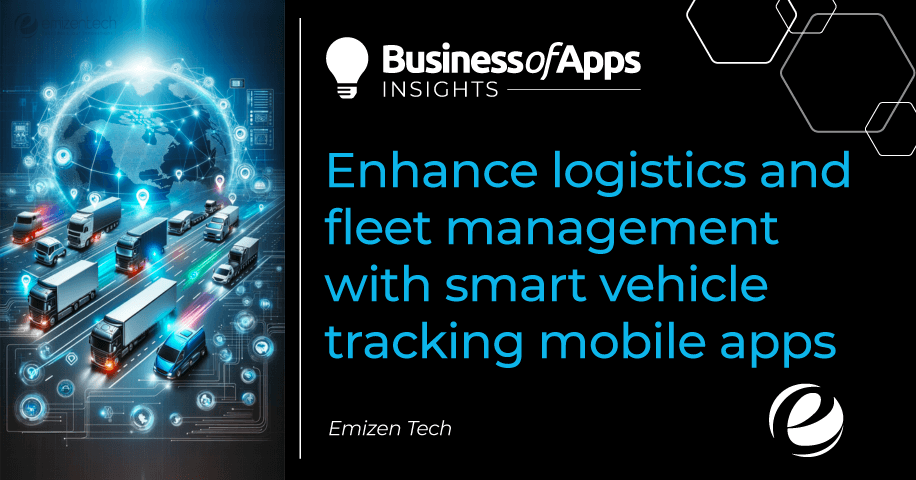With the rising demand for preventing theft, improving security measures, location tracking, driver accountability, fleet management, and more, the adoption of smart vehicle tracking solutions, on both app and web, is increasing with time.
The latest report by Grand View Research states that in 2022, the global vehicle tracking system market size reached $21.54 billion, and from 2023 to 2032, the figure is expected to elevate at a CAGR of about 14.1%.
Today, smart vehicle tracking apps are widely chosen for improving visibility in logistics operations, preventing theft, enhancing fuel efficiency, lowering maintenance costs, helping with efficient time management, and much more. Well, this is not enough; there is more to explore to harness the capabilities of this advanced surfacing technology.
This post will help you discover details about smart vehicle tracking, working, how it can assist in logistics and fleet management, features you should include in your smart vehicle tracking app, and much more.
So, let’s get the ball rolling!
What is a smart vehicle tracking app?
As the term says, a smart vehicle tracking app leverages advanced technologies to monitor and track vehicles in real time. A GPS tracking device is installed in vehicles that collect and transfer data, like speed, location, and other vehicle specifications, to a central software platform, a mobile app, or a web app.
How does a smart vehicle tracking mobile app work?
Before starting with the work of a smart vehicle tracking app, let’s first check the essentials of the entire process.
Essentials
- GPS Tracking Devices
- Server for Tracking Software
- GPS Connection
- Digital Maps
- GSM Network
How it works?
- The GPS device (in the vehicle) communicates with satellites to track its location.
- The receiver (in the GPS device) or device collects geospatial details through satellites.
- A report contains the vehicle’s speed, movement, and coordinates.
- Ahead, the report is compiled leveraging special software and stored in a database on servers or any central location for easy access.
- All the details are showcased in easy-to-understand digital maps on mobile apps.
Note: The entire tracking process takes around 3 to 10 seconds, which helps fleet managers know real-time drivers’ behavior and other factors that impact fuel costs.
Must-have features of a smart vehicle tracking mobile app
Let’s discuss some features you should include in your smart vehicle tracking app.
Driver behavior monitoring
This is one of the critical features that helps increase fleet safety. Using it, fleet managers can easily monitor drivers’ behavior and enforce safe driving habits.
GPS tracking
The GPS-powered real-time vehicle tracking feature seamlessly monitors and offers useful data and insights about the commercial fleets, like real-time location, fuel status, driving speed, braking, and more. This helps the owners to create smarter route planning, prevent cargo theft, automate real-time alerts, etc.
Route optimization
You can make a better route plan and optimize the routes based on the real-time details available on route closures, traffic data, the fastest route, and more.
Trip history
An innovative smart vehicle tracking mobile app should have this feature that best tracks every trip made by the specific vehicle, including idle times, distance traveled, acceleration, stoppages, and more. This way, you can make better decisions for your fleet business.
Geo-fencing
This feature helps with real-time alerts and notifications whenever vehicles reach or exit a designated geofence area during the trip. Fleet business owners can create any number of geofences per their requirements for vehicle movement tracing and get notifications for their vehicles and drivers.
Offline data tracking
A weak network is a common issue that can hit you hard. So, to save yourself, you can include an offline data tracking feature in your smart vehicle tracking app to prevent data loss in areas with weak or no networks. Later, when the network is available, tracked and stored data on the hardware goes to the server and gets synced.
Customized reports
The smart vehicle tracking mobile app should permit the users to create custom reports relevant to driver history, pick and drop location, and more that can assist in making informed business decisions.
Unlimited vehicle support
The app should hold a feature that allows users to connect with any number of vehicles and collect and manage data flawlessly.
This is not much; various features are there that can power up the smart vehicle application and sound productive and cost-effective to the users.
Challenges of smart vehicle tracking app development
It’s a well-known fact that a good aspect comes with hurdles that demand an invasion.
Here, developing a smart vehicle tracking app also comes with some challenges. Let’s check a few, along with the apt solutions to follow.
Data security and privacy
Challenge: The device you install in your vehicle will track almost every piece of information, even the sensitive ones, which raises data security and privacy concerns.
Solution: Implement robust security measures like data encryption during data storage and transfer. Also, the clear communication of privacy policies to every user and compliance with related data protection regulations can save you.
Costs and ROI
Challenge: Some businesses may find the initial investment and ongoing costs of smart vehicle tracking apps to be heavy.
Solution: A thorough cost-benefit analysis can help them to determine ROI. They can also highlight the long-term benefits, like improved efficiency, fuel savings, and diminished maintenance costs.
Power-consumption of tracking devices
Challenge: A tracking device’s battery life can influence the tracking app’s reliability.
Solution: Device settings optimization for extending battery life and updating frequency can help. Besides, using long-lasting batteries or strengthening the apps with power-saving technologies can work perfectly.
Hardware reliability
Challenge: The hardware components, like GPS devices, sometimes experience technical glitches or may fail.
Solution: Hardware components testing and regular maintenance are essential. Additionally, reliable and high-quality hardware can diminish the risk of failures.
Integration with existing systems
Challenge: A new vehicle tracking mobile app can be complicated when integrated with existing software and management systems.
Solution: Choose a system that can offer easy integration options, like APIs, and perform closely with the solution provider, leading to a seamless integration process.
Network connectivity issues
Challenge: Poor network areas compromise the communication between tracking devices and the central hub.
Solution: A tracking system that can seamlessly store and forward data when reconnected can greatly help. You can also implement multiple communication channels, ensuring better coverage.
Conclusion
Smart vehicle tracking mobile apps are best at enhancing logistics and fleet management that, in turn, help improve customer service, diminish operational costs, increase road safety, improve fuel efficiency, boost productivity, enhance fleet visibility, control fuel expenses, prevent theft, and more.
You can also reap the benefits of smart vehicle tracking apps by connecting with a leading mobile app development company and building your commercial fleet group. The company should adopt the solutions to confront the challenges that can emerge on your way to success.











